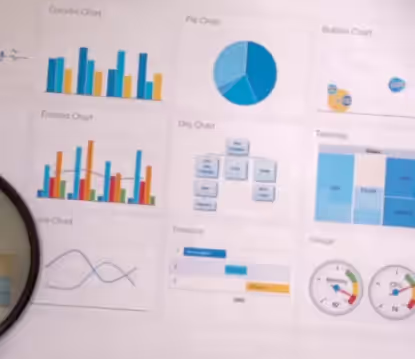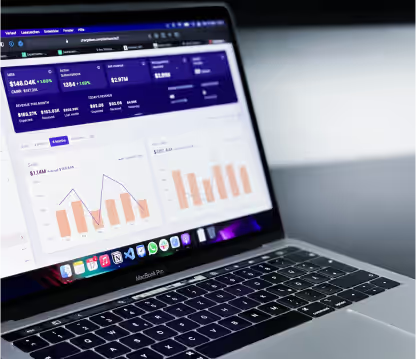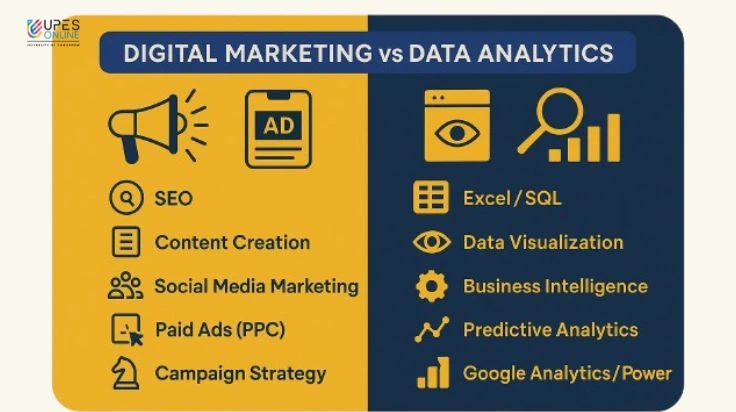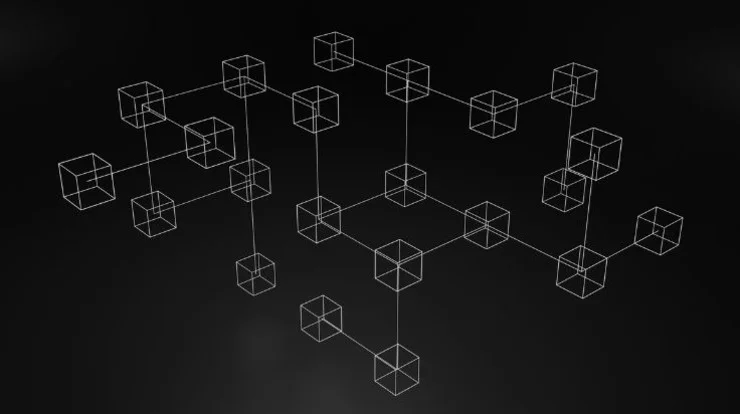Ace Your Data Governance Interview with these 55 Question Types

Table of Contents
- Frequently Asked Data Governance Interview Questions
- Core Concept Based Interview Questions
- In-depth Interview Questions
- Technical Interview Questions
- Situation Based Interview Questions
- Security Based Interview Questions
Data governance has morphed from a dusty boardroom term to a critical cornerstone of success in today’s data-driven world. Organizations are scrambling to unlock the full potential of their information assets, and that means finding skilled professionals who can navigate the complex realm of data governance.
Recruiters are asking specific questions to assess your grasp of core concepts, experience with implementing best practices, and ability to navigate challenges. Prepare to dive deep into data governance with these:
10 frequently asked Data Governance interview questions for Freshers & Experienced (and answer tips):
For starters, you need to understand and grasp these 10 basic questions asked by recruiters in every interview. Make sure to add data points wherever necessary and real-life project you’ve worked on.
1. Question: Briefly define data governance. What are its key objectives?
- Emphasize the overarching goal of managing data as a strategic asset. Mention ensuring data quality, accessibility, security, and compliance with regulations.
- Showcase your understanding of key objectives: Data ownership, policy creation, risk management, and promoting data literacy.
2. Question: Describe the different components of a data governance program.
- Demonstrate your familiarity with the foundational building blocks: Data management framework, data quality rules, access controls, metadata management, and security measures.
- Expand on specific components: Briefly explain the role of data cataloging, lineage tracking, and monitoring tools.
3. Question: How do you approach data quality management within a governance framework?
- Highlight proactive measures: Defining data quality standards, implementing cleansing processes, and monitoring for anomalies.
- Mention data quality tools and techniques: Data profiling, anomaly detection, and master data management solutions.
4. Question: Describe your experience with data security and access control in data governance.
- Emphasize the importance of data security: Explain data encryption, role-based access control, and incident response protocols.
- Mention specific tools or frameworks you’ve used: Identity and access management (IAM) systems, data loss prevention (DLP) tools, and security information and event management (SIEM) platforms.
5. Question: How do you ensure data privacy and compliance with regulations like GDPR or CCPA?
- Demonstrate your awareness of relevant regulations: Briefly explain key principles of data privacy and compliance requirements.
- Highlight your experience with implementing compliance measures: Data subject access requests, data anonymization techniques, and breach notification procedures.
6. Question: How do you handle and resolve data governance challenges like conflicting policies or siloed data?
- Focus on communication and collaboration: Explain how you’d involve stakeholders, identify root causes, and develop solutions to bridge data silos.
- Showcase your problem-solving skills: Mention specific examples of overcoming data governance challenges in previous roles.
7. Question: What are your thoughts on the evolving landscape of data governance? Emerging trends and challenges?
- Demonstrate your forward-thinking mindset: Mention trends like automation, artificial intelligence, and cloud-based data governance solutions.
- Discuss potential challenges: Data integration across hybrid environments, ethical considerations of data analytics, and managing the increasing volume and variety of data.
8. Question: How do you measure the success of a data governance program?
- Go beyond traditional metrics: Mention improved data quality, increased data-driven decision-making, and reduced compliance risks.
- Showcase your analytical skills: Briefly explain how you’d track and report on key data governance metrics.
9. Question: Describe your experience with building a data governance culture within an organization.
- Emphasize communication and awareness: Mention training programs, data governance champions, and promoting data accountability.
- Share specific examples: How you’ve engaged stakeholders, fostered data ownership, and championed data governance initiatives.
10. Question: What are your career aspirations in data governance? How do you envision your skills evolving in the future?
- Show your commitment and ambition: Discuss your desire to take on leadership roles, participate in industry initiatives, and stay abreast of evolving trends.
- Focus on continuous learning: Mention your desire to acquire new skills and adapt to the changing data landscape.
Core Concept Based Data Governance Interview Questions
Recruiters are increasingly testing your knowledge on the fundamental data governance concepts, focusing on practical application and alignment with current trends. Prepare these 10 questions:
1. Question: Explain the difference between data governance and data management.
- Data governance: Defines the framework, policies, and principles for managing data as a strategic asset. Focuses on ownership, security, compliance, and quality.
- Data management: Refers to the technical tools and processes used to implement data governance policies. Involves data integration, storage, access control, and analysis.
2. Question: Describe the evolving relationship between data governance and cloud technology.
- Highlight the challenges of decentralized data storage and access in cloud environments.
- Mention cloud-based data governance platforms and security solutions.
- Discuss the need for flexible and scalable data governance frameworks adaptable to cloud adoption.
3. Question: How do you handle the increasing complexity and variety of data sources in today’s organizations?
- Emphasize the importance of data cataloging and lineage tracking to understand data relationships and dependencies.
- Mention utilizing metadata management tools to ensure data quality and accessibility across diverse sources.
- Briefly explain the impact of unstructured data and emerging technologies like AI on data governance strategies.
4. Question: Explain how data governance impacts and supports data analytics and AI initiatives.
- Highlight the role of high-quality and accessible data as the foundation for accurate and reliable analytics.
- Discuss data privacy and ethical considerations in AI development and deployment.
- Mention collaboration between data governance and analytics teams to ensure responsible and efficient data utilization.
5. Question: How do you measure the success of data governance initiatives? Go beyond traditional metrics.
- Focus on business impact indicators: Improved decision-making, increased operational efficiency, cost reduction, and enhanced customer experience.
- Mention data-driven metrics: Reduced data errors, improved data access rates, and compliance adherence.
- Briefly explain the potential use of predictive analytics to assess the effectiveness of data governance programs.
6. Question: Describe your approach to building a data governance culture within an organization.
- Emphasize communication and awareness training for all stakeholders.
- Mention championship programs to promote data ownership and accountability.
- Discuss incorporating data governance principles into performance evaluations and decision-making processes.
7. Question: How do you address data governance challenges posed by remote work and distributed teams?
- Highlight the importance of secure data access and collaboration tools for remote access.
- Discuss the need for standardized data policies and procedures to ensure consistency across different locations.
- Mention utilizing technology and communication platforms to foster collaboration and data transparency.
8. Question: What are your thoughts on the integration of data governance and the emerging concept of “Data Fabric”?
- Explain the Data Fabric as a unified platform for seamlessly managing and connecting data across diverse sources.
- Discuss the potential of Data Fabric to simplify data governance complexities and enhance data accessibility.
- Mention potential challenges and the need for robust data governance frameworks within the Data Fabric ecosystem.
9. Question: How would you approach a situation where data governance policies conflict with business needs or agility?
- Emphasize the importance of open communication and finding balance between compliance and business objectives.
- Discuss options like risk-based decision-making and establishing clear guidelines for exceptions to policies.
- Mention the role of data governance committees in facilitating collaborative decision-making in such situations.
10. Question: What are your personal learnings and areas of improvement related to data governance? How do you stay up-to-date with industry trends?
- Demonstrate your commitment to continuous learning and professional development.
- Mention industry publications, conferences, or online communities you follow to stay informed about current trends and best practices.
- Briefly discuss specific topics you’re interested in exploring further within data governance.
In-depth Data Governance Interview questions
Remember to get a good grasp on data governance core concepts with these 10 insightful questions:
1. Question: How would you design a data governance framework for a company transitioning to a hybrid cloud environment?
- Answer: Emphasize cloud-specific considerations like data residency, secure access control, and integration with existing on-premises infrastructure. Mention utilizing cloud-based data governance tools and leveraging service provider security controls.
2. Question: Explain your approach to implementing a data ethics framework within an organization.
- Answer: Discuss establishing ethical principles (e.g., fairness, transparency, accountability) for data collection, use, and analysis. Mention ethical AI considerations and ensuring compliance with relevant regulations.
3. Question: Describe your experience with identifying and mitigating data quality issues within complex data pipelines.
- Answer: Highlight data profiling and anomaly detection techniques. Mention data cleansing processes and collaborating with technical teams to address underlying causes of data quality issues.
4. Question: How do you handle stakeholder resistance to data governance initiatives, particularly from business units focused on short-term goals?
- Answer: Emphasize data governance’s long-term benefits to business objectives (e.g., revenue, efficiency). Propose flexible implementation approaches and involve stakeholders in defining policies to ensure alignment.
5. Question: Explain your thought process for prioritizing data governance initiatives amidst competing resource constraints.
- Answer: Utilize risk-based analysis to identify critical data assets and areas with the highest impact potential. Consider cost-benefit analysis and potential return on investment for different initiatives.
6. Question: Describe your experience using data governance to address regulatory compliance challenges.
- Answer: Highlight specific knowledge of relevant regulations (e.g., GDPR, CCPA) and their impact on data practices. Mention implementing data subject access request procedures and breach notification protocols.
7. Question: How do you leverage data governance to foster better collaboration and data sharing within an organization?
- Answer: Discuss establishing clear data ownership and access protocols. Mention utilizing data catalogs and collaboration platforms to facilitate secure data sharing and joint analysis.
8. Question: Explain your approach to building and maintaining data lineage across diverse data sources and systems.
- Answer: Discuss data lineage mapping tools and techniques. Mention utilizing metadata management to improve data traceability and facilitate impact analysis in case of issues.
9. Question: How would you design a data governance program for a specific industry or data-driven domain (e.g., healthcare, finance)?
- Answer: Demonstrate industry-specific knowledge and identify relevant data governance challenges and considerations. Tailor your answer to the specific domain and its regulatory landscape.
10. Question: Share your thoughts on the potential disruptive impact of emerging technologies like blockchain or federated learning on data governance practices.
- Answer: Discuss potential benefits and challenges of these technologies for data security, privacy, and governance. Suggest potential adaptations or new frameworks needed to address these technologies’ implications.
Technical Data Governance Interview questions
Prepare to showcase your deep understanding of tools, architectures, and best practices with these 10 in-depth questions usually asked for data governance job roles:
1. Question: Describe your experience with implementing data quality rules and data cleansing processes within a data governance framework.
- Answer: Mention specific data quality tools and techniques you’ve used (e.g., profiling, anomaly detection, data validation). Discuss techniques for cleansing inconsistent or inaccurate data and handling missing values.\
2. Question: Explain your approach to designing and implementing secure data access controls and user roles within a data governance system.
- Answer: Highlight your knowledge of role-based access control (RBAC) models and attribute-based access control (ABAC) principles. Discuss user authentication and authorization protocols, focusing on multi-factor authentication and data encryption techniques.
3. Question: How do you ensure data lineage tracking and auditability within complex data pipelines and distributed architectures?
- Answer: Mention your understanding of data lineage mapping tools and their integration with data pipelines. Discuss audit logging best practices and utilizing metadata management tools for improved data traceability.
4. Question: Describe your experience with data masking and anonymization techniques for preserving data privacy and compliance with regulations.
- Answer: Explain different data masking methods (e.g., tokenization, differential privacy) and their suitability for different scenarios. Discuss the importance of balancing data utility with privacy considerations.
5. Question: How do you approach data governance challenges specific to cloud-based data platforms and SaaS applications?
- Answer: Highlight your knowledge of cloud security models and compliance certifications specific to the cloud provider. Discuss considerations for data residency, secure data access from external applications, and integration with on-premises data governance frameworks.
6. Question: Explain your experience with data federation and data virtualization within a data governance context.
- Answer: Demonstrate your understanding of data virtualization tools and their benefits for consolidating data access without physical data movement. Discuss data governance considerations for federated data sources and ensuring consistent data quality and security across diverse platforms.
7. Question: How do you leverage big data analytics platforms and machine learning tools for data governance purposes?
- Answer: Mention using analytics for anomaly detection, data profiling, and identifying data quality issues. Discuss utilizing machine learning for automated data classification and risk assessment within data governance programs.
8. Question: Explain your approach to implementing data governance for unstructured data sources like text, images, and sensor data.
- Answer: Highlight your knowledge of data cataloging and metadata management tools for unstructured data. Discuss utilizing content analytics or AI-powered solutions for classification and tagging of unstructured data to facilitate governance.
9. Question: How do you stay up-to-date with evolving data governance technologies and best practices in the context of your technical expertise?
- Answer: Mention following industry publications, attending conferences, participating in professional communities, and exploring new data governance tools and platforms. Showcase your passion for continuous learning and adapting to technological advancements.
10. Question: Share your thoughts on the potential impact of emerging technologies like blockchain or federated learning on technical data governance practices.
- Answer: Discuss how these technologies can address specific data governance challenges like security, privacy, and transparency. Mention potential challenges and the need for adapting existing data governance frameworks to effectively manage data in these new paradigms.
Situational Data Governance Interview questions
Be prepared to demonstrate your critical thinking, problem-solving, and decision-making abilities with these 10 situational questions:
1. Question: You discover a critical data asset is being stored on unauthorized personal cloud storage by an employee. How do you handle this situation?
- Answer: Focus on immediate action and long-term prevention. Immediately secure the data, involve IT security, and communicate the breach to relevant stakeholders. Propose additional training on data security policies and implement stricter data access controls to prevent future occurrences.
2. Question: A new department requests access to sensitive customer data for a marketing campaign. How do you balance providing access with data privacy considerations?
- Emphasize the importance of data minimization and access controls. Propose granting read-only access to a specific data subset instead of the entire dataset. Implement data masking techniques to protect sensitive information and clarify data usage restrictions in the access agreement.
3. Question: Your data lineage tracking shows inconsistencies in a key financial report. How do you investigate and ensure data integrity?
- Highlight the importance of root cause analysis. Collaborate with data analysts and technical teams to trace the inconsistencies back to their source. Address underlying data quality issues and implement data validation processes to prevent future discrepancies.
4. Question: You face resistance from a business unit leader who sees data governance as a hinderance to their agility. How do you address their concerns and demonstrate the value of data governance?
- Emphasize data governance’s role in enabling better decision-making. Use clear examples of how data quality issues or non-compliance can lead to business losses. Propose a collaborative approach to implementing data governance policies that support their agility while ensuring data integrity.
5. Question: A data leak occurs due to a vulnerability in a third-party vendor’s system. How do you manage the crisis and prevent future incidents?
- Focus on immediate damage control and long-term risk mitigation. Notify stakeholders, activate breach response protocols, and work with the vendor to address the vulnerability. Conduct a thorough review of third-party agreements and implement stricter vendor data security requirements.
6. Question: You’re tasked with integrating data governance practices across two recently merged companies with different data cultures. How do you approach this challenge?
- Emphasize communication, collaboration, and flexibility. Conduct a gap analysis to identify differences in data policies and procedures. Facilitate workshops and training to build a shared understanding of data governance best practices. Implement a flexible rollout plan that accommodates existing systems while gradually converging towards a unified data governance framework.
7. Question: You encounter ethical concerns surrounding how a specific data set is being used within the organization. How do you navigate this situation?
- Emphasize transparency and stakeholder engagement. Raise the ethical concerns with relevant decision-makers and advocate for transparent communication with employees and potentially impacted individuals. Work to develop solutions that balance data utilization with ethical considerations and adhere to relevant data privacy regulations.
8. Question: Your company’s data governance program fails to achieve its initial objectives. How do you analyze the reasons and propose improvements?
- Focus on data-driven analysis and stakeholder feedback. Gather data on program metrics, conduct surveys with stakeholders, and identify areas where the program fell short. Propose specific revisions to address identified gaps, adjust implementation strategies, and measure the effectiveness of changes made.
9. Question: You’re presented with an opportunity to utilize a new data governance technology within your organization. How do you evaluate its potential and ensure successful implementation?
- Focus on a risk-based and strategic approach. Conduct a thorough cost-benefit analysis and assessment of the technology’s alignment with your data governance goals. Develop a pilot program to test the technology and ensure its compatibility with existing infrastructure and user adoption before large-scale implementation.
10. Question: Imagine you’re leading a data governance initiative during a major organizational crisis. How do you adapt your approach and ensure data remains reliable and secure amidst the chaos?
- Emphasize clear communication and crisis management protocols. Communicate data governance priorities and adapt policies as needed to address the crisis. Ensure data security measures are strengthened and maintain transparency with stakeholders regarding data management practices during the crisis.
Security Based Data Governance Interview questions
Data security is increasingly interwoven with data governance in today’s landscape. Be prepared to demonstrate your understanding of how data governance practices enhance security posture and address emerging threats with these 5 relevant interview questions:
1. Question: Explain how data governance contributes to building a strong organizational cyber security posture.
- Answer: Highlight how data governance practices like data classification, access controls, and data loss prevention (DLP) help identify and protect sensitive information. Mention incident response protocols established through data governance that ensure timely and effective action against security breaches.
2. Question: How would you integrate new security technologies like Zero Trust or Secure Access Service Edge (SASE) into your data governance framework?
- Answer: Discuss how Zero Trust principles align with data governance practices of least privilege and continuous authentication. Mention utilizing SASE solutions for secure data access from diverse locations and cloud environments while maintaining data governance compliance.
3. Question: Describe your experience implementing data encryption techniques as part of a data governance strategy.
- Answer: Explain different encryption methods (e.g., at-rest, in-transit) and their suitability for various data types and scenarios. Mention your experience with key management practices and ensuring secure encryption implementation within data governance frameworks.
4. Question: How do you address the security challenges posed by the adoption of cloud-based data platforms and big data technologies?
- Answer: Discuss the importance of cloud provider security certifications and data residency considerations for sensitive data. Mention utilizing cloud-based data governance tools and adapting existing data governance policies to address specific cloud security risks.
5. Question: Explain your approach to mitigating data-related security risks associated with emerging technologies like IoT devices or AI-powered analytics.
- Answer: Highlight the importance of secure device onboarding and data access controls for IoT devices. Discuss potential ethical considerations and privacy risks associated with AI algorithms and ensuring data governance practices address these emerging concerns.
As data governance continues to evolve, the questions on interviewers’ minds will inevitably shift. But one thing remains constant: the need for individuals who can champion responsible data practices and unlock the true potential of our information assets. Brush up your skills in these areas, you’ll not only ace your next interview but also contribute to building a data-driven future where data integrity, security, and ethical use reign supreme.
So, bookmark this article, keep these trends in mind, and confidently navigate your next data governance interview – we’ll be cheering you on!
UPES Online Admission Enquiry
Recommended Courses





Latest Blogs

Digital Marketing vs Data Analytics: Which Career Should You Choose?
Battle of skills: Digital Marketing vs Data Analytics—compare 2025 salaries, skills & job roles. Expert tips to choose your future career path!
Read MoreJun 15, 2025 I 12 mins
Why Should I Choose UPES Online? 10 Reasons Why
Explore why UPES Online stands out in online education. Learn about flexible learning, UGC-approved degrees, expert faculty & credible online programs. Enroll now!
Read MoreAug 21, 2025 I 5 min
Can Distance Learning Fully Replace Traditional MBA Education? Challenges & Limitations
Find out if distance learning can truly replace a traditional MBA. Learn key challenges, limitations, expert opinion & insights.
Read MoreSep 2, 2025 I 4 mins
Online MBA Capstone Projects and the Importance They Hold
Know the importance of online MBA capstone projects. Learn how they build real-world skills, boost career opportunities, & add industry value.
Read MoreSep 7, 2025 I 5 mins
UPES Online MBA vs Other Top Universities: Why Students Prefer UPES
Compare UPES Online MBA with other top universities. Know why students prefer UPES online over others. Check fee, flexibility, faculty, ROI, & career scope.
Read MoreOct 1, 2025 I 7 mins







